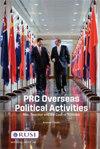V. Defence and Security in Northern Europe: A German Perspective
Q4 Social Sciences
引用次数: 1
Abstract
In recent years, NATO has been confronted with a number of political and military game-changers that have demanded the most fundamental adjustment of its role and self-image since the end of the Cold War. Three developments are particularly striking. First, in 2014, Moscow shattered the European peace by using military force to aggressively assert its great-power ambitions. Russia’s illegal annexation of Crimea and its support for the rebels in Eastern Ukraine have forced NATO back into the world of Article 5, where the Alliance must back up its commitments with credible military forces. Second, at the same time, upheaval in the Middle East and North Africa has escalated into sustained violence by state and non-state actors. Countless groups, including Islamists – supported by various regional and external powers – are fighting each other with the utmost brutality. This has led to an export of religious violence beyond these regions and in 2015 sparked a huge flood of refugees into Europe, especially into economically strong EU states such as Germany. Never before have European societies been so directly and visibly affected by destabilising developments far from their national borders. Third, US President Donald Trump has already fundamentally altered the basics of transatlantic security relations and thereby affected the foundations of NATO. Through inexperience in foreign affairs, reliance on misleading information, and inconsistent reasoning, he has profoundly undermined the US as a moral authority and leader of the West – in other words, of the international community of liberal democracies. Moreover, he has weakened the US’s traditional role as the ‘benign hegemon’ within五、北欧防务与安全:德国视角
近年来,北约面临着许多政治和军事游戏规则的改变者,他们要求对其角色和自我形象进行自冷战结束以来最根本的调整。有三个事态发展尤其引人注目。首先,2014年,莫斯科使用军事力量积极维护其大国野心,破坏了欧洲和平。俄罗斯对克里米亚的非法吞并及其对乌克兰东部叛军的支持迫使北约回到了第五条的世界,北约必须用可信的军事力量来支持其承诺。第二,与此同时,中东和北非的动荡升级为国家和非国家行为者的持续暴力。包括伊斯兰主义者在内的无数团体——受到各种地区和外部势力的支持——正在以最残忍的方式相互争斗。这导致了宗教暴力向这些地区以外的地区输出,并在2015年引发了大量难民涌入欧洲,尤其是德国等经济实力强大的欧盟国家。欧洲社会从未如此直接和明显地受到远离国界的不稳定事态发展的影响。第三,美国总统唐纳德·特朗普已经从根本上改变了跨大西洋安全关系的基础,从而影响了北约的基础。由于在外交事务上缺乏经验、依赖误导性信息和前后矛盾的推理,他深刻地削弱了美国作为西方道德权威和领导人的地位——换句话说,就是自由民主国际社会的地位。此外,他还削弱了美国作为内部“良性霸权”的传统角色
本文章由计算机程序翻译,如有差异,请以英文原文为准。
求助全文
约1分钟内获得全文
求助全文
来源期刊

Whitehall Papers
Social Sciences-Archeology
自引率
0.00%
发文量
12
期刊介绍:
The Whitehall Paper series provides in-depth studies of specific developments, issues or themes in the field of national and international defence and security. Published three times a year, Whitehall Papers reflect the highest standards of original research and analysis, and are invaluable background material for policy-makers and specialists alike.
 求助内容:
求助内容: 应助结果提醒方式:
应助结果提醒方式:


